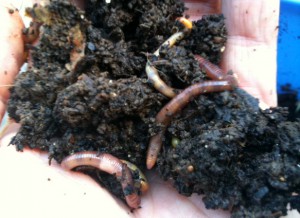Worms eat my garbage

A year ago, Becky Jo Farrington from Michigan Energy Options came to the Michigan Environmental Council office peddling worms.
She was selling earthworms a standard plastic bin. They will eat garbage, proliferate like earthworms and create compost she promised.
I bought a kit for about $30 that included the booklet “Worms Eat My Garbage”, the bin, a starter kit of worms, and bedding.
The little creatures were hard to spot in the bin filled with wet newspaper, food scraps, and an occasional black pindot of a worm casting. And during several months of diligent feeding they made little progress. By fall, blackened, months-old banana peels remained intact, there were precious few dots of worm castings, and the worms were still hard to find when sifting through the bin.
Winter came, and I left the shiftless worms in the garage alone, untended, unfed. Forgotten.
Come spring, Karen lit into me. They’re living creatures, and you froze them to death, she harrumphed. “Killer” she called me for the better part of one day.
They sat for a couple more weeks, and I wondered: Would the remains stink to high heaven? I was in no hurry to find out. So the worm bin languished.
When I finally screwed up the courage to open the lid, I was stunned. It was one-third full of the blackest, richest, moistest compost I’d ever seen or felt. The “shiftless” worms had, indeed, worked themselves through every bit of the meager food I’d abandoned them with, and left me a legacy of natural fertilizer oozing with kick-ass nutrients including micro-nutrients and beneficial bacteria that you don’t find in conventional fertilizers.
I was humbled, and a little ashamed that I had so casually cast aside these creatures that – despite my negligence – had continued working through the cold winter to provide with this bounty.
The compost will be spread on our vegetable garden, where it will live on, I vowed. Some of its nutrients will make its way into our bodies, where it will fortify us against disease, illness, and the physical insults of advancing years. Eventually, I’ll become worm food, and the cycle will have come full circle.
But before I got around to using the compost, I was in for another shock.
Not dead yet!
“Your worms didn’t die!” Shouted Karen through the phone a few days later. “There are tons of them!”
Improbably, the scrappy little worms had survived the winter, and procreated like, well, earthworms. Karen, digging deep into the compost, had come up with writhing knots of worms very much alive and, probably, very hungry.
Most of them are now burrowing through our garden and flower beds, leaving behind tiny little pellets of natural nutrients. The rest are in the bin, eating a buffet of banana peels, orange rinds, coffee grounds and strawberry tops as they start a second season of compost.
Becky Jo assures me the overwintering survival is not normal. It must have been the shelter and warmth of our unheated garage, combined with the mild winter that saved my worms.
I’ve learned my lesson: I don’t know ***t about worms. But I know this: Next winter, they’ll get a reserved spot in the basement.
For information on getting worms from Michigan Energy Options, call 517-337-0422 or email [email protected]
###



Comments are closed.